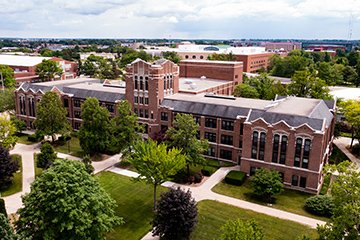Doctoral student studies new way to combat tuberculosis
Priscilla Dzigba researched antibody-recruiting molecules to study and potentially fight against diseases like tuberculosis and nontuberculous mycobacteria.
Priscilla Dzigba, a doctoral student studying Biochemistry, Cellular, and Molecular Biology, is focused on developing antibody-recruiting molecules to combat the bacteria that cause tuberculosis and other mycobacterial diseases.
Mycobacteria are a group of bacteria that cause hard-to-treat diseases like tuberculosis (TB), nontuberculous mycobacteria (NTM) disease, leprosy, diphtheria, and Buruli ulcer. Many bacteria, including mycobacteria, have become resistant to existing drugs because antibiotics have been used too much or not in the right way. Antibiotic resistance is a global problem that is expected to kill more than 10 million people by 2050. TB and NTM are becoming more and more recognized as major causes of this problem.
Antibody-recruiting molecules (ARMs) are man-made molecules that can bind to two different targets: a naturally occurring antibody in the human body and a molecule on the surface of bacteria. When these two targets get closer to each other, ARMs can tell the immune system to fight the pathogen and kill it.
Dzigba developed the first ARM to target mycobacteria. She made a new compound named Tre-DNP, which is an ARM that puts a dinitrophenyl (DNP) molecule on the surface of mycobacteria. She also demonstrated that the DNP binds antibodies naturally present in blood that recognize DNP molecules. People have many of these antibodies, which bind strongly to the DNP molecules on the bacterium’s surface. By making these antibodies interact with mycobacteria, ARMs can possibly help the immune system find and get rid of mycobacteria faster. Dzigba found that modifying mycobacteria with ARMs influenced how immune cells respond to the bacteria, which is a significant step toward figuring out how to use the host’s immune system to fight illness.
Dzigba says, “I hope that my findings will help to lay the groundwork for more effective therapies in addition to existing conventional therapies for patients with TB and NTM, particularly those afflicted with drug-resistant strains.” She also hopes that her findings will spur additional studies into the design and synthesis of ARMs for other infectious diseases as well as non-infectious diseases such as autoimmune disorders and allergies. “ARMs may provide a viable and adaptable platform for engaging immune activity in human diseases.”
After graduation, Dzigba plans to pursue a career in synthetic immunology and intends to work with other researchers to transfer scientific discoveries into therapeutic applications and social advantages. On her journey to CMU, Dzigba says, “I was especially pleased to come in and work with two experts in Synthetic Chemistry and Immunology, Dr. Benjamin Swarts and Dr. Mallary Greenlee-Wacker, on creative ideas and collaborative research like mine. CMU seemed like the appropriate setting and support system for me to pursue graduate research and fulfill my academic and professional goals.”
This story is brought to you by the Office of Research and Graduate Studies.




